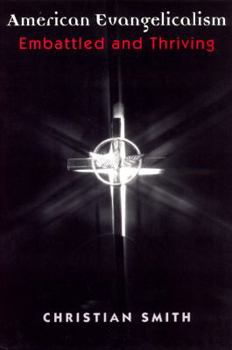American Evangelicalism: Embattled and Thriving
Select Format
Select Condition 
Book Overview
Evangelicalism is one of the strongest religious traditions in America today; 20 million Americans identify themselves with the evangelical movement. Given the modern pluralistic world we live in, why is evangelicalism so popular? Based on a national telephone survey and more than three hundred personal interviews with evangelicals and other churchgoing Protestants, this study provides a detailed analysis of the commitments, beliefs, concerns,...
Format:Paperback
Language:English
ISBN:0226764192
ISBN13:9780226764191
Release Date:October 1998
Publisher:University of Chicago Press
Length:324 Pages
Weight:1.30 lbs.
Dimensions:0.7" x 6.1" x 9.0"
Customer Reviews
2 ratings
A Book to Disabuse Stereotypes
Published by Thriftbooks.com User , 24 years ago
Chris Smith's book challenges the stereotypes that many people hold about Christians, particularly evangelical Protestants. I was, frankly, surprised by the sheer ambivalence of evangelicals that Dr. Smith interviewed; these people are clearly not the tyrannical demagogues that many believe them to be! Journalists, academics, people who are truly committed to tolerance and open-mindedness, and serious religious thinkers should read it--period--just to have a deeper understanding of a vast segment of the American population. Dr. Smith presents an information-packed, refreshingly nuanced picture of American evangelicals. It is a book that deserves attention, particularly for those who are interested in religious anthropological questions, but also for those who are serious about having their stereotypes challenged. Mine were.
"A myth-busters book"
Published by Thriftbooks.com User , 26 years ago
This was a myth-busters book, at least for me. I thought American individualism, and the emphasis on personal choice, undermined the strength of churches. After all, if people don't like what their getting, they can just hop over to another church. Smith says no: because people in modern America choose their communities, they tend to be more committed to them.I thought corporate and bureaucratic, mass culture, which trains people to be distant and driven, undermined their ability to be in community. Not so, says Smith. It only makes people more hungry for personalized, intimate, community like the church.I thought, a la Dean Kelly's classic _Why Conservative Churches Are Growing_, that evangelicalism thrived because it gave people an alternative world to live in. No way, says Smith: "American evangelicalism ... is strong not because it is shielded against, but because it is--or at least perceives itself to be--embattled with forces that seem to oppose or threaten it. Indeed, evangelicalism ... thrives on distinction, engagement, conflict and threat. Without these, evangelicalism would lose its identity and purpose and grow languid and aimless. Thus ... the evangelical's movement's vitality is not a product of its protected isolation from, but of its vigorous engagement with pluralistic modernity."As in the beginning, Smith argues, mainliners are engaged in society but do not see themselves as distinct from it, and fundamentalists know they're distinct, but they never meaningfully engage culture. Evangelicals thrive in the in between place: embattled AND thriving.Smith offers many more insights on evangelicalism today. (One more I though fascinating: in abandoning its strictures on card playing and going to movies evangelicalism hasn't been co-opted by culture, as some critics argue. Instead, new evangelical boundaries have been drawn that help define the "real" evangelical--listening to Christian rock, not observing Halloween, and the like).There's enough to argue with, as well. Smith, for example, doesn't think the dominant evangelical social strategy (changed lives will change society) is very effective. I agree that many people are called to do more than change individual lives. But I'm not sure a sociologist can measure the impact of this strategy one way or another. And anecdotes to the contrary abound: the preacher who converted Billy Graham made a huge impact on American culture.Quibbles aside, Smith is to be credited with getting this historian to do something I steadfastly avoid: commit sociology. If you want to get fresh insights into modern evangelicalism, you may want to do the same.--Mark Galli, editor, Christian History






